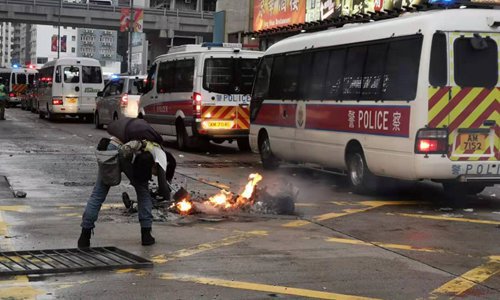HOME >> OPINION
Taiwan authority is politicizing murder case
Source:Global Times Published: 2019/10/21 22:03:40

A journalist takes pictures of a fire set by protesters in Mong Kok, Hong Kong on Sunday. Photo: Wang Cong/GT
Chan Tong-kai, who is suspected of murdering his pregnant girlfriend in Taiwan, will be released on Wednesday. He said he would surrender himself to Taiwan after his release. But Taiwan rejected the offer on Sunday, claiming Chan was manipulated to surrender and that this was Hong Kong's political maneuver.
Chan allegedly killed his girlfriend in Taiwan in February last year and fled to Hong Kong. It is his case that prompted the Hong Kong government to amend the extradition bill and later triggered unprecedented social turmoil in Hong Kong. But before the anti-extradition bill protests emerged, Taiwan had already issued an arrest warrant for Chan, which is still valid today. Hong Kong's relevant law is strict in this regard. It cannot investigate and convict Chan for the murder because the incident occurred outside Hong Kong's jurisdiction. At this point, Chan is willing to turn himself in to Taiwan. The case is supposed to proceed in Taiwan.
Yet in Taiwan, the course of the incident took a turn. Amid the escalating political chaos in Hong Kong, Taiwan authorities are trying to make a few political points. Plus, the "presidential election" is approaching. What if Chan's case brings unknown changes to the current Taiwan authorities' future approval ratings?
Whether Chan decides to turn himself in voluntarily, or under manipulation as Taiwan claims, it would only be known after he arrives in Taiwan. Taiwan authorities could by then hype Chan being politically manipulated if that is the case. But it seems not confident in doing so. It is the Taiwan authorities who are calculating the case from political perspective.
On the other hand, if Chan goes to Taiwan, how Taiwan judges will hardly have any impact on Hong Kong's street violence. Chan's case will not have a huge impact on Taiwan either and the island should make its legal judgment as it is supposed to do as a pure criminal case. But Taiwan authorities have been thinking too much about it. As the election approaches, the current Taiwan leader Tsai Ing-wen and her colleagues are highly sensitive and fully wary of any risks the case may bring to the Democratic Progressive Party's performance in the elections.
The Taiwan-style elections, which are based on a Western-style political system, have gone extreme. The combination of "presidential election" and the topic of "Taiwan secession" have blurred a variety of issues which used to be very clear, and have confused public opinion. Because of the election, a criminal case cannot proceed in accordance with the law in Taiwan. The island's politics, being narrow-minded, is doomed to a bleak future.
.
.
Posted in: EDITORIAL